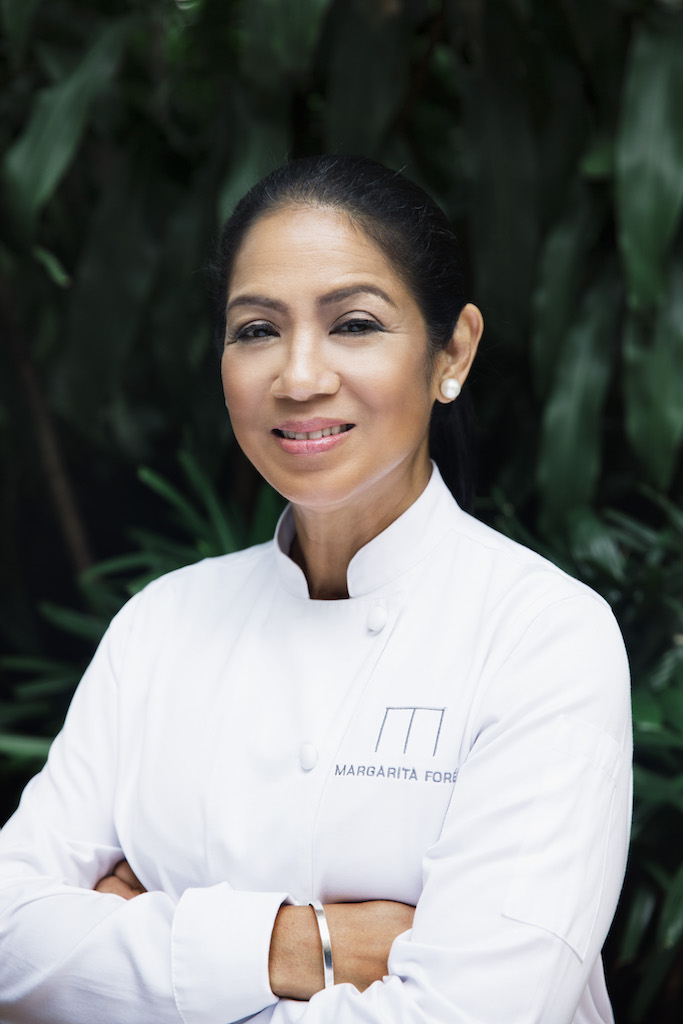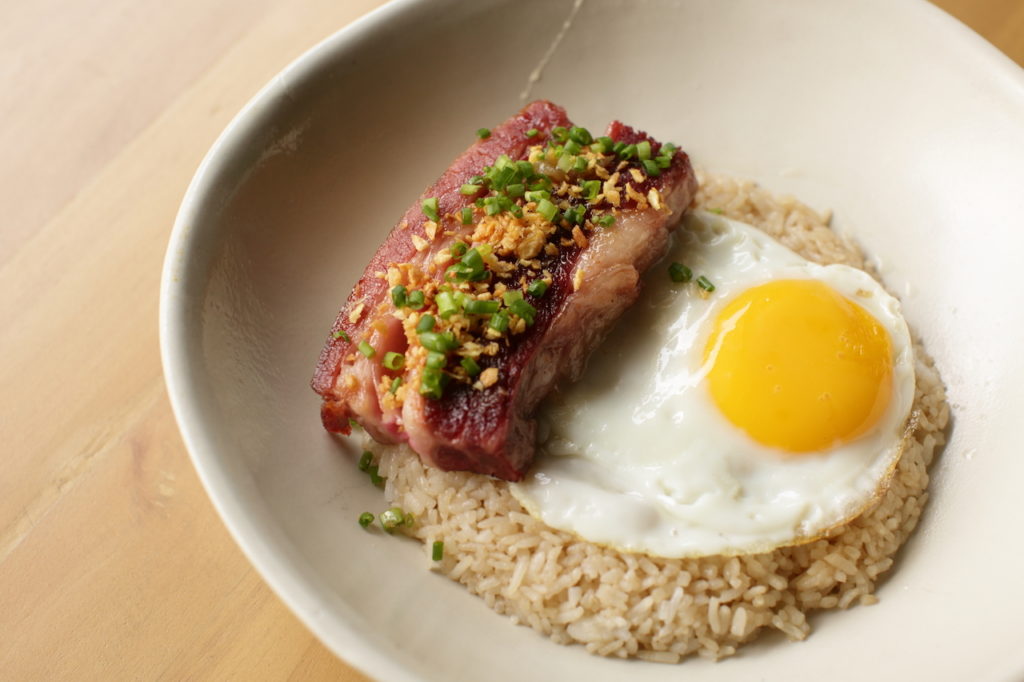“I went into culinary because I just needed a job,” laughs chef Tony Boy Escalante when asked about how he got into the restaurant industry.
The former dental student went from tooth fillings to fulfilling his diners’ culinary wishes at his Antonio’s dining destination in Tagaytay, which celebrates its 15th year of operations this year. His route took him around the world as a flight attendant and deciding that it was not for him, he went back to his culinary roots in Iloilo where food brings families together.
While toiling in the professional kitchen at Mandarin’s Tivoli Grill, under the watchful eyes of chefs Norbert Gandler and Humphrey Navarro, Escalante would do private dining on weekends and his days off. “As long as there were 10 of you, I would cook for you at my Tagaytay home,” he recalls.
This fed his passion, and along with his growth, bore a bigger dream. Antonio’s Restaurant opened in November 2002. And throughout the years, it has reeled in a handful of recognitions, including mentions in the Miele Guide, twice; a ranking of 48th on San Pellegrino’s Asia’s 50 Best Restaurants list; the Manitowoc Restauranteur of the Year Award, and without question, just one of the best restaurants in the country. Perhaps more significantly, it gave birth to other concepts, Breakfast at Antonio’s and Balay Dako.
Such has been the ongoing legacy of the stalwart chef. He has definitely endured the most trying times and continues to fight in a very crowded and competitive arena. But he knows better now and charges most of his decisions to experience. Luck and perfect timing might have been a considerable part of his success, but no one can’t discount his impeccable taste in design, service, and good food. The same goes for Margarita Forés and the formidable team behind The Moment Group (TMG), both of whom also celebrate similar triumphs as Tony Boy; their 20th and fifth anniversaries, respectively.
With a notable number of restaurant years under their belt, they are the first to testify that the struggle is indeed real. But just as quick as that declaration can they swear that those times have also been among the most exhilarating, inspiring, and incomparable experiences of their lives.

Wise man says
Escalante’s vision was nothing really grand. “We started out really small, and my concept really was casual but elegant, reminiscent of how we lived and dined in Bacolod. It was ‘they’ who called it fine dining.” Whatever the scale, everybody wanted to be part of it, and claim to have gone through the Antonio’s experience. “The main challenge I have encountered is to manage expectations. I do this by simply doing my best and somehow I manage to surpass it. Even from the beginning, I was not after winning awards; it was about being able to offer my best to my guests. Then, when I do get recognition, I share it with the people I work with.” The accolades may help extend and boost your presence, but it can only take you so far. Those don’t guarantee a longer shelf life. “You know, it is hard to open a restaurant, but I think it is harder to maintain it. You can do this only if you invest in your people.”
“The main challenge I have encountered is to manage expectations. I do this by simply doing my best and somehow I manage to surpass it. Even from the beginning, I was not after winning awards; it was about being able to offer my best to my guests. Then, when I do get recognition, I share it with the people I work with,” says Tony Boy Escalante.
Escalante has been called many things—brilliant, hardworking, a rock star—and has gotten worthwhile media coverage and plaques for that. But one thing not many has called him out for is his savvy. He knows where he is best at and he remains there. “It’s not like Asia in the ‘80s and early ‘90s when you had to go to a hotel to enjoy good food,” he observes of the current generation. Even with the trends that have come (and gone), he has remained true to his roots. “I admire those who do fusion, but I am old-school. I would never do anything that does not have my soul in it.”
He is quick to admit that he is not tech-savvy. And so to tap into the younger market, he hired a team to update his website and handle his brand’s social media. Getting himself into this game didn’t even cross his mind. “My younger clients now were four or five when I opened Antonio’s. My teenage guests who visited with their families then are now dads,” he laughs. “Be honest with yourself if you can or cannot do it, not just because you have the money to start your business. The best way to success is knowing yourself and knowing what you want to do.”

Still in training
If Escalante knew what he wanted to do early on, it was the opposite for Forés who describes her 10-year learning curve as a “slow burn.” “I was a media novelty and people were writing about me, which was very helpful. But I was also on party mode and I was disorganized, arriving on gigs late. It was fortunate that these were friends of my mom, so they were very kind and supportive, and didn’t really hold me to the parts where I didn’t deliver. They also saw some sincerity on my part because I was working on this by myself with just one or two helpers,” she recalls.
She only took her craft seriously when she had her son. “It was a wake-up call because I became responsible for another person’s life. Before that, I viewed my profession as a hobby. This made me do a life check, got my act together, and started concentrating on my catering in earnest.”
“You have to continue to be at a learning standpoint with all the people you encounter. Today, you can learn from the older chefs and from the younger ones who have had the opportunity to study things like molecular gastronomy,” says Margarita Forés.
In 1997, she opened Cibo, a concept that was practically unheard of at the time. She introduced authentic Italian dishes to a public that was used to eating their spaghetti soggy and with hotdogs. “My Bolognese was al dente, it wasn’t sweet, and a lot of people reacted. I stuck to the concept of authenticity, with my menu in Italian with translations, with the instructions that there were no substitutions. I was and still am picky with what ingredients to source for my pasta or panino.” Being a stickler for legitimacy obviously has rewarded her well, with a dozen branches, to be exact.
“The biggest lessons I learned in this industry, I learned from my failures,” she muses. And that the secret to longevity is constant learning and appreciation of what is new. “You have to continue to be at a learning standpoint with all the people you encounter. Today, you can learn from the older chefs and from the younger ones who have had the opportunity to study things like molecular gastronomy,” says the chef who has brought learning opportunities to the Philippines in the form of Madrid Fusion Manila.
Making a mark in the restaurant industry
There is a synergy between Abba Napa, Eliza Antonino, and Jon Syjuco that was evident from the very beginning. Napa recalls that incident when they were eating at their outlet and in unison, unconsciously left their table to offer their seats to those waiting in line. “We didn’t even talk about it, we just stood up. It showed that we have the same wavelength, that same dedication to offering not only food but hospitality to our customers.” It’s this that has become among the strongest foundations not just of their friendship, but of TMG, a company that continues to show much promise since it started in 2012, with the opening of Cue. “When we opened it, we were just doing it for fun. It was the worst reason,” she laughs. “After that, it became very exciting in the dining scene, and we got very excited as well. It was not hard to create a new concept in that atmosphere.”
“The industry has grown so much in the five years that we realized there are so many things going on and maybe we get to make an impact,” Antonino adds. “The Filipino diner just wants to explore and have new experiences, and we have fun in creating those new experiences for them, whether with our homegrown restaurants or the ones that we bring in. I think that is the primary reason why we have grown so much exponentially.” This year, they have grown to 10 brands and 27 branches spread across these concepts.

Unlike Escalante and Forés who call the shots in their own businesses, with TMG, the three decide as one. They have to rely on each other and though they argue a lot, their bickering turns to constructive debates that not only help fully dissect problems, but also result in well informed decisions. “When we don’t argue over something, that’s when we have a problem,” Syjuco quips.
The team plays smart and doesn’t jump on the bandwagon just because it’s the trendiest thing to do at the moment. “When we create restaurants, we look at underserved categories. If someone is doing well in a certain space, we don’t try to compete. There are so many opportunities that can be filled because the industry is very young. We create things that might not be existing or might need more on.”
For Syjuco, the biggest challenge is curbing their enthusiasm. “We really do dream big, and with the market and the opportunities that are very exciting, we find it hard to say no. We created a path wherein we over-commit, so we have to make sure we don’t falter.”
“When we create restaurants, we look at underserved categories. If someone is doing well in a certain space, we don’t try to compete. There are so many opportunities that can be filled because the industry is very young. We create things that might not be existing or might need more on,” says John Syjuco.
Antonino agrees, “We are very fortunate to find ourselves in that position to be able to make something of opportunities or craft our own opportunities, but sometimes we may bite off more than we can chew.” This, coming from another revelation that they “sweat the small stuff,” where they are engaged in the smallest detail, even in the planning of the space, down to the lighting and the borders on the walls.
Their vision is to uplift the restaurant industry, and they certainly have done much to contribute to it. Though not easy, the three are ready, willing, and able to get the job done. “As hard as it is to build, it is 10 times harder to run. There is so much that goes behind a restaurant group, which is why you need to have people who are dedicated to that vision,” says Napa. Luckily, they have each other—and a growing workforce of over 1,000.
Originally published in F&B Report Vol. 14 No. 5





